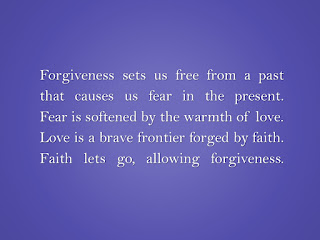I discovered this basically by
accident, by the way of learning something in a way we learn all great things
we learn. We cannot forgive unless we feel for the perpetrator who acted
against us. We cannot let them off unless we see in ourselves the same propensity
to afflict that pain. As they have done, we also are capable. We must see that.
We need to see that we’re the same
as everyone else, and that we’re angriest when we face the sins that most
afflict ourselves.
Of course, these are difficult
things to explain and to understand.
That which I cannot change about
me, which I hate about myself most, angers me most about others, because I,
myself, am thwarted.
I cannot forgive what I see is
unforgiveable in me. And that, too, I often cannot see.
I cannot forgive what I cannot see
God forgiving in me.
I will not allow safe passage to
anyone or anything when that safe passage is forbidden for me.
I cannot lead others in a thing I
previously have not learned.
“I” is the limitation. But God wants
us connected, brought face-to-face, with these parts we despise. In connecting
with others we must first come into connection with ourselves.
The Role of Empathy
Empathy is connection,
illumination, revelation. It’s the lightbulb moment. Empathy is the electricity
of compassion energising love. Empathy is a miracle, for without it everything
of virtue in this unreachable place seemed out of grasp. Empathy grounded
reason in a language the self could understand. Empathy is the “AHA” moment.
It is sad that empathy, however, is
often so fleeting. We feel its connectivity like the brewing of a sneeze, and
within seconds at times it’s gone. It explains why forgiveness, like happiness,
can be so elusive.
Forgiveness in certain unreconciled
situations is the hardest thing we’ll ever do. Some circumstances we’re so resistant
to empathy we cannot look forward for the habit of looking back.
If we can only see the folly in our
enemy is a folly we hate in ourselves. Yet, if we ask God to make it plain to
our sight, He will reveal it if it’s there. We must ask God to connect us to
these truths, and the way to such connection points is through empathy.
The blessed connection of empathy
is the maturity of acceptance; the wisdom of understanding.
Fear as a Hidden Barrier to Forgiveness
And here’s a reason why forgiveness
is worth the conquest:
Forgiveness sets us free from a
past that causes us fear in the present.
Fear is softened by the warmth of
love. Love is a brave frontier forged by faith. Faith is the key to a future
forgiveness. Faith lets go, allowing forgiveness.
Fear is the only barrier to our
destiny. Forgiveness compels us in bravery to keep moving forward by faith.
Even if we’re still some distance
from that forgiveness we believe we may at some time have, we have hope, and in
faith one day we’ll come to enjoy our achieving it, by God’s grace.
Grace that believes is also a grace
that empowers, meeting a divine grace that appears by night, making the
impossible a reality in the morning.
Such is our faith, by God’s mysterious
provision, able to connect ground with the stars.


No comments:
Post a Comment